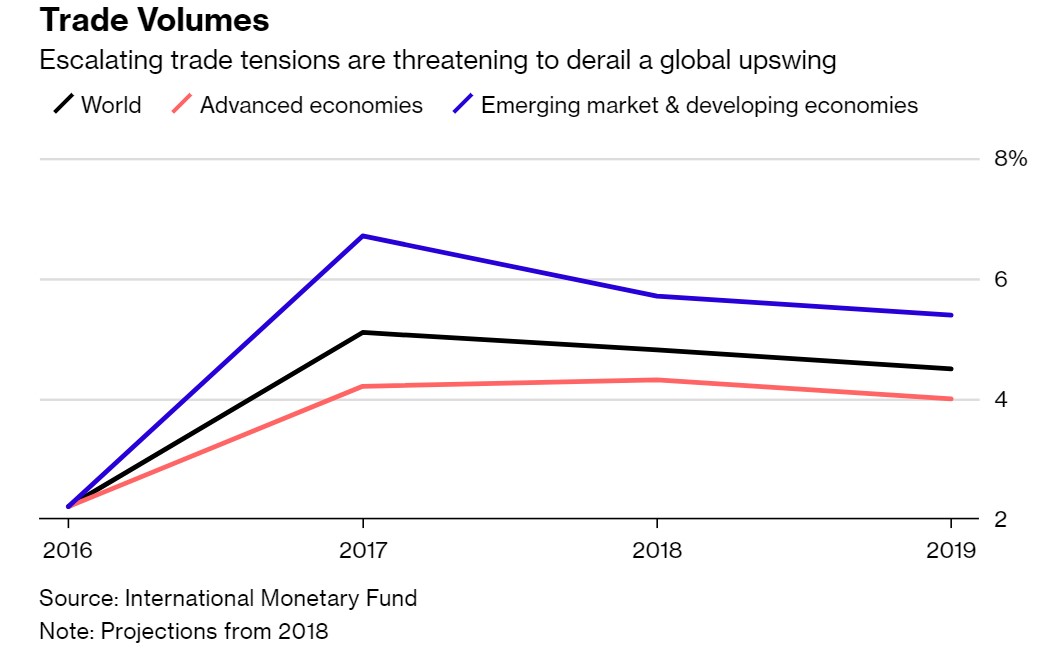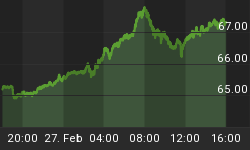Monday, July 16, 2018
Geopolitical uncertainty amid. President Trump met with Russian President Vladimir Putin on Monday, with talks taking place behind closed doors. A raft of corporate earnings this week have huge ramifications for the stock market, and a few earnings figures from major banks reported Monday morning look solid. But the $200 billion in potential tariffs on Chinese goods proposed by the Trump administration will loom over the financial system over the next few weeks. Weak data from China also suggests a coming slowdown.
Chart of the Week

(Click to enlarge)
- The U.S. is preparing $200 billion in tariffs on Chinese goods, which would dramatically intensify the trade war between the two countries.
- The IMF warned that growth could slow and that the financial markets are complacent to the risks that lie ahead. Growth is becoming increasingly uneven, the Fund argued.
- “The risk that current trade tensions escalate further -- with adverse effects on confidence, asset prices, and investment -- is the greatest near-term threat to global growth,” IMF chief economist Maurice Obstfeld said.
Markets
Chinese economy cooling as trade war heats up. New data shows that China’s GDP grew at a 6.7 percent annualized rate in the second quarter, down from the 6.8 percent rate in each of the previous three quarters. The problem now is that the economy is cooling at a time when trade barriers are rising. “The question is what happens when tariffs spill over into real data,” said ING strategist Benjamin Schroeder. Related: U.S. Rent Costs Hit All-Time High
Risks coming for stocks. The economy is strong and stocks still have room to rise, but the trade war poses risks that are not yet priced in. "We're in the eighth or ninth inning of the bull market. Those innings can be strong," Guggenheim Partners Executive Chairman Alan Schwartz said on Monday. “The cyclical move in the economy is positive and is driving of the things that are good for risk assets," Schwartz added. "But there are tremendous storm clouds on the horizon."
IMF: Growth strong but risks “mounting.” The IMF said that global GDP will expand by 3.9 percent both this year and in 2019, but “the expansion is becoming less even, and risks to the outlook are mounting.” In some major economies, the rate of expansion “appears to have peaked,” with growth projections revised down in Japan, the Eurozone and the UK. Higher oil prices, higher interest rates and escalating trade tensions also pose threats to growth in developing countries, the Fund said, with outlooks revised down in Argentina, Brazil and India.
Commodities
Dollar slips, gold firms up. Gold prices steadied on Monday on a dip in the dollar. The greenback posted strong gains last week, and the U.S. Federal Reserve is expected to continue hiking interest rates, keeping a lid on gold prices. "While interest rates were zero there was no real cost to holding gold, it was just like holding cash, now there is a cost," said Matthew Turner, analyst at Macquarie. "The lack of big compelling themes is a problem for gold, prices are very high compared to where they were before the GFC (great financial crisis) and investor demand isn't there."
China’s commodity imports drop. A slowdown in Chinese demand for commodities is in the offing, with imports of oil and iron ore down 5 percent and 12 percent, year-on-year, respectively. On a month-on-month basis, China’s imports of oil, natural gas and iron ore are down 9 percent, 2 percent and 12 percent, respectively, according to Barclays. Still, imports of copper are up 23 percent year-on-year, and imports of coal are 18 percent higher.
Commodities sink on trade war. The Bloomberg Commodities Index, a measure of 26 raw materials, lost 2.7 percent last week, the largest weekly loss since February. The declines were all the more notable because other sectors posted gains. Soybeans suffered the most, with prices falling to the lowest in a decade, weighed down by the escalating trade war between the U.S. and China. Copper prices also fell to a one-year low.
Energy
Oil prices fall sharply. Oil prices posted significant losses in early trading on Monday, as concerns about supply shortages eased on the return of production from Libya. “The energy complex is a sea of red as concerns about supply outages subside,” Stephen Brennock, analyst at London brokerage PVM Oil Associates, told Reuters. But the market is not in the clear, with plenty of flashpoints that could affect supplies, including a strike in Norway, a kidnapping and potential outage in Libya, and unrest in southern Iraq.
Hedge funds cut bullish bets on oil. Hedge funds and other money managers slashed their bullish positions last week, a reduction in net length coinciding with a steep selloff in crude prices. Positions are still relatively bullish, so the liquidation is not all that unusual. “The market definitely saw a pullback of commitments on the long side,” Phil Flynn, a senior market analyst at Price Futures Group Inc. in Chicago, told Bloomberg. “It might be choppy here for the next couple days but the big picture is we still have a very tight market.”
Related: The U.S.-Chinese Race To End All Privacy
WoodMac: Peak oil demand within 20 years. Wood Mackenzie predicted in a recent report that there will be a “tectonic” shift in the transportation sector over the next few decades, and the mass adoption of electric vehicles will lead to a peak in oil demand by around 2036. There are plenty of forecasts calling for peak oil demand, but this one is notable because Wood Mackenzie works closely with oil companies on market analysis, so its prediction carries weight within the industry. “A lot of our clients recognise that peak demand is real,” said Ed Rawle, Wood Mackenzie’s head of crude oil research. “It’s just a question of when it arrives.”
Cryptocurrencies
Bitcoin jumps on Blackrock interest. The price of Bitcoin surged on Monday after a report said that Blackrock, the private equity giant, was exploring ways to profit from cryptocurrencies. Blackrock reportedly setup a working group to explore the possibility of investing in bitcoin futures. Bitcoin was up more than 4 percent, moving above $6,600. Other digital currencies, such as Ethereum and ripple, also received a jolt.
G20 watchdog publishes framework to monitor cryptocurrency assets. The Financial Stability Board (FSB), which offers recommendations to the G20 on the financial system, submitted a framework to monitor cryptocurrency assets, which “should help to identify and mitigate risks to consumer and investor protection, market integrity, and potentially to financial stability.” The framework will focus on price volatility, the size and growth of initial coin offerings, and the use of digital currencies as payment.
American Express looking at blockchain. American Express is exploring ways to use blockchain technology to improve transactions. Coindesk reports that American Express has filed a patent application to use a “blockchain-based system” in order to receive “payment confirmation including a transaction amount and a merchant identifier.” The idea would be to provide quality evidence of a transaction “beyond a receipt or ticket.”
By Michael Kern for Safehaven.com
More Top Reads From Safehaven.com:
















